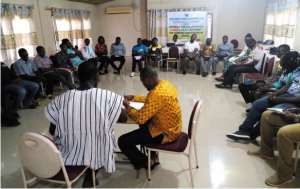
An NGO, Global Hand on Natural Environment Care (GHANECare) is calling on government to integrate the Planting for Food and Jobs (JFJ) Programme into the Food and Agriculture Sector Development Policy (FASDEP II) for Sustainability.
He noted that currently the Planting for Food and Jobs programme is not integrated into the FASDEP II which makes its sustainability questionable.
The Executive Director of GHANECare, Richard Kuunaah, made the call during the advocacy training workshop on FASDEP II at Techiman in the Brong-Ahafo region.
The four-day advocacy training workshop on review of the FASDEP II was aim at enhancing the capacity of members of GHANECare to enable them advocate for the integration of the Planting for Food and Jobs into the FASDEP II.
The major goal of the project titled: Advocacy for the Review of FASDEP II Policy Document for Economic Robustness in Ghana is to advocate for reviewing the FASDEP II to integrate the Planting for Food and Job (JFJ) programme for sustainability .
The Planting for Food and Jobs (PFJ) is a flagship programme of the NPP Government designed and being implemented aim at promoting growth in food production and create jobs across the country.
Under the PFJ programme, all Ghanaians are encouraged to grow some cereals or vegetables on their farms or backyards.” In addition, all institutions, private and public, are to be encouraged to set up their own farms.
The Planting for Food and Jobs programme is expected to increase the production of maize by 30 per cent; rice by 49 per cent; soybean by 25 per cent; and sorghum by 28 per cent from current production levels. This programme is expected to create 750,000 jobs in both direct and indirect employment according to MOFA,
Mr Kuunah said the FASDEP II is aimed at serving as a framework for the implementation of strategies geared toward making agriculture in the country modernised, adding that integration of the PFJ into FASDEP II will help achieve its results.
Mr. Kuunaah said it is estimated that as much as about 80% of Ghana's arable land is uncultivated, in part due to insecure property rights, saying there is the need for increased investments in infrastructure in the Agric sector for development.
The participants who are mostly famers complained about high interest rate on loans in the country preventing private businesses especially farmers from access loans.
According to them, farmers who are most vulnerable to food and nutrition insecurity have limited resources to respond to agricultural programmes
The participants therefore called on the government to put pressures on financial institutions in the country to cut down on their interest rate to enable them to have access to loans to boost their businesses.
They were further unhappy about the poor road infrastructure in rural areas that makes food distribution more difficult and lowers producers’ prices thereby contributing to the poverty level of farmers in the country.
Improving the road infrastructure in farming communities will go a long way to boost agriculture production and enhance the livelihood of farmers.




 Tuesday’s downpour destroys ceiling of Circuit Court '8' in Accra
Tuesday’s downpour destroys ceiling of Circuit Court '8' in Accra
 SOEs shouldn't compromise on ethical standards, accountability – Akufo-Addo
SOEs shouldn't compromise on ethical standards, accountability – Akufo-Addo
 Father of 2-year-old boy attacked by dog appeals for financial support
Father of 2-year-old boy attacked by dog appeals for financial support
 Jubilee House National Security Operative allegedly swindles businessman over sa...
Jubilee House National Security Operative allegedly swindles businessman over sa...
 Nobody can order dumsor timetable except Energy Minister – Osafo-Maafo
Nobody can order dumsor timetable except Energy Minister – Osafo-Maafo
 Mahama wishes National Chief Imam as he clock 105 years today
Mahama wishes National Chief Imam as he clock 105 years today
 J.B.Danquah Adu’s murder trial: Case adjourned to April 29
J.B.Danquah Adu’s murder trial: Case adjourned to April 29
 High Court issues arrest warrant for former MASLOC Boss
High Court issues arrest warrant for former MASLOC Boss
 Align academic curriculum with industry needs — Stanbic Bank Ghana CEO advocates
Align academic curriculum with industry needs — Stanbic Bank Ghana CEO advocates
 Election 2024: We'll declare the results and let Ghanaians know we've won - Manh...
Election 2024: We'll declare the results and let Ghanaians know we've won - Manh...
